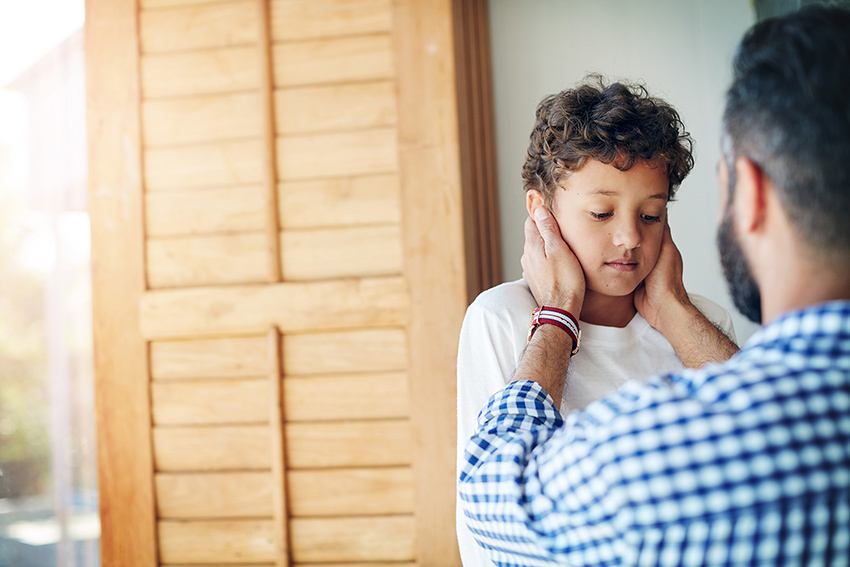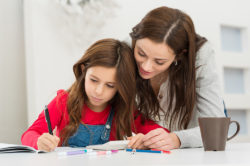
How do you help a child through grief associated with the illness or loss of a loved one while you yourself are grieving? There’s a special team at CHoR that can answer that difficult question and provide kindness and support along the way.
Mental health professionals at our Virginia Treatment Center for Children specialize in helping children experiencing grief at all stages. When families are initially faced with the illness, injury or death of an adult relative in the hospital, the clinical teams at VCU Health often turn first to our Helping Children of Adult Patients team. HCAP is made up of members of our pediatric team with specific training and expertise in talking with children about a family member’s medical situation.

“The process of understanding and grieving is different for every child and family,” said Siri Garrett, child life specialist and member of the HCAP team at CHoR. “We’re here to help children process their feelings of grief, as well as help caregivers understand what a specific child may be experiencing developmentally and provide age-appropriate strategies for supporting them.”
Our mental health and HCAP teams offer the following suggestions for helping children understand and cope with the loss of a loved one.
Concept of death
The concept of death becomes more concrete as children age. Infants and toddlers do not understand the concept or permanence of death. However, they do know when a sad event like a severe illness, injury or death has happened in their family and feel the stress of separation. Usually they respond by looking more anxious or regressed, but may not be able to identify the cause for the distress as a loss.
Even children as old as five rarely understand that death is permanent and that everybody dies eventually. They often ask “How?” and “Why?” and they may ask the same questions over and over again. Patience and reassurance that nothing they did or thought caused this event to happen are key at this age.
Children in the 6-12 age range may understand that all people die and that death is irreversible, but they may still ask questions about the physical process of death and dying. As a result of this the children in this age group may be more visibly upset and fearful. They may ask questions like what happens when people are buried or become more worried about monsters in the closet or the boogeyman coming to get them. Supporting them through this by answering questions at a level they can understand is always helpful.
As they progress into their teenage years, adolescents continue to develop the ability to think about the world beyond the here and now. Not only will most adolescents understand the concepts of death and dying, but they will also recognize the future implications of loss. For instance, their grieving process will include the realization that their loved one won’t be around for important events such as graduations and birthdays.
How children show stress and cope
Children respond to the illness or loss of a loved one in different ways depending on their age, maturity level and personality. Changes in eating and sleeping habits tend to be common across the spectrum. It’s also common for children to be moody. In younger children this often comes across through crying or fussiness, while older children and teens may be irritable or exhibit more emotional swings than usual. Regressive behaviors are also normal during periods of grief. Younger children may go back to bedwetting, baby talk or thumb sucking. Older children may seek an old comfort item such as a stuffed animal, or stop doing chores or self-care. You might also notice changes in behavior, such as aggression, isolation or clinginess.
It’s not uncommon for younger children to work through their understanding and feelings through play. They may have their cars crash, or dolls go to the hospital. Other children, particularly as they get older, may act like nothing has changed or immerse themselves in hobbies or schoolwork. It’s also normal for grief to come in waves. A child may talk about death, then go play as if nothing happened, then start crying. Observing for regressions and responding with comforting activities are at times more helpful than talking about the event.
Helping children with their grief
While grief is a personal process, children (and adults) benefit from the support of their loved ones. Be intentional about spending time with your children, both individually and together if you have more than one. Help young children understand what is happening using simple, concrete words. Stay away from vague statements, such as “Grammy went bye-bye,” to avoid confusion between a temporary absence and a permanent one.
As children get older and more in tune with their emotions, discuss the types of feelings people tend to have when someone they love dies. Encourage questions and healthy expressions of concerns and listen with warmth, acceptance and understanding. Be honest and clear when answering their questions and keep the lines of communication open, but don’t force conversation if they’re not open to it. Younger children will need simple explanations, while older children and adolescents may have more in-depth questions. It’s okay to tell them you don’t have all the answers.
Children, especially at younger ages, may need some extra physical comforting and reassurance. Allow regressive behavior, but help children and adolescents be aware of and avoid impulsive actions. It is also a good idea to inform the teacher and school counselor about the situation so they are prepared to offer understanding and support as needed.
Children find comfort in routines. Maintain routines as much as possible, such as sticking to regular bedtimes, meals, etc. with familiar and consistent caregivers. It is also essential, over time, to help children build confidence in their ability to face and effectively cope with pain. For example, children may show fear and avoidance of reminders of loss and may withdraw from pleasurable activities or routines. Supporting children in taking baby steps to face their pain will teach them emotion regulation skills and promote resilience.
As children grapple with the concept of death and loss, they may need help to feel positive about their future. Use statements such as, “This is very hard for you right now, but you will be okay.” It is also important to reassure them regarding their sense of safety with statements like, “You are loved. You will be safe and taken care of.”
It is essential to monitor children’s grief responses for misplaced feelings of guilt, self-blame and helplessness. Children may also display unhelpful thinking patterns associated with these feelings. For example, children may incorrectly believe that the painful feelings will stay forever or that more bad things will continue to happen. Children may need professional help if they do not respond to reassurance by their caregiver with regard to these thoughts and feelings. It is okay, and encouraged, to reach out for support. School counselors, faith-based leaders, grief support groups and mental health professionals can offer families ongoing support.
Activities to help with coping
Children often look to adults to model healthy behaviors, including during times of grief. Being open about your own feelings can help children learn how to express themselves. Encourage and join them in some of the following coping activities as well:
 Share stories and talk about what you loved most about your loved one
Share stories and talk about what you loved most about your loved one- Participate in memorial services and activities to honor your loved one (give children choices about their involvement)
- Journal, color or draw pictures
- Create a memory box
- Choose and keep a familiar article of clothing or pillowcase of the loved one
- Celebrate holidays with familiar traditions, such as visiting a special place or making a favorite meal
- Talk with friends or other trusted individuals about your thoughts and feelings
- Help them resume participation in enjoyable activities
Read additional, age-specific expectations and recommendations for coping and support.
If you feel your child could use some extra help with their feelings and emotions following a loss or life-altering illness or injury of a loved one, talk with their pediatrician or seek the assistance of a mental health professional.
By Dr. Jaee Bodas, licensed clinical psychologist and Siri Garrett, child life specialist
Medical executive editor for mental health blog series: Bela Sood, MD
